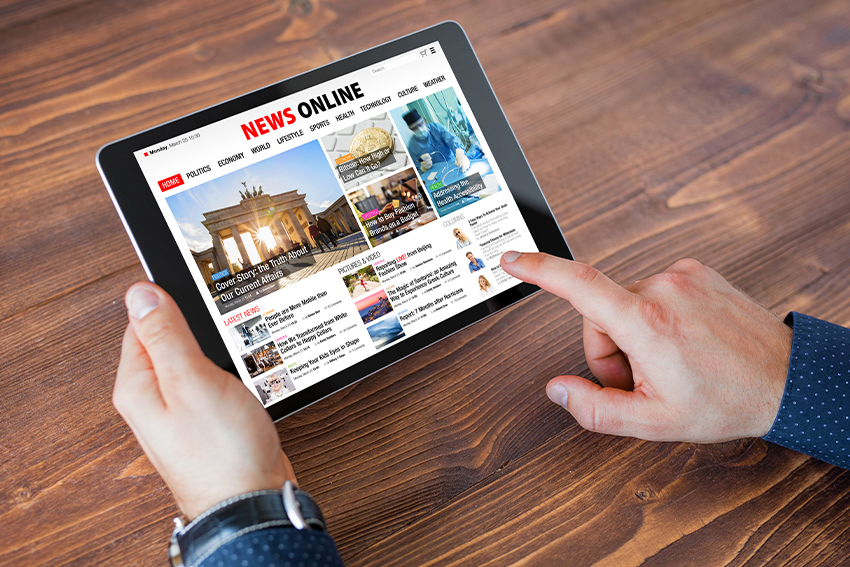The 2-Minute Rule for International News Online
The 2-Minute Rule for International News Online
Blog Article
What Does International News Online Do?
Table of ContentsFacts About International News Online RevealedSee This Report on International News OnlineAn Unbiased View of International News OnlineInternational News Online for DummiesThe Best Guide To International News Online
Some social media websites despite having reasonably tiny overall target markets stand out for having high shares of individuals who on a regular basis go to the website for information. On the other hand, only 15% of Snapchat individuals regularly obtain information on the application.
, Sept
When asked whether social media is a good or poor point for freedom in their country, a typical of 57% across 19 nations say that it is an excellent point. In virtually every nation, close to fifty percent or even more say this, with the belief most usual in Singapore, where approximately three-quarters think social media is a great thing for democracy in their country.
And in the united state, only around a third think social networks declares for democracy the smallest share among all 19 countries surveyed. In 8 nations, those that think that the political system in their country allows them to have an impact on politics are additionally most likely to claim that social media sites is an advantage for freedom.
Those that view the spread of incorrect info online as a significant threat to their nation are less most likely to state that social media is a good idea for freedom, compared to those that check out the spread of false information online as either a small risk or otherwise a threat in all.
Not known Facts About International News Online
This pattern is noticeable in eight other nations. Sights additionally vary by age. Older adults in 12 nations are less most likely to state that social networks is a great thing for freedom in their country when contrasted to their younger counterparts. In Japan, France, Israel, Hungary, the UK and Australia, the gap between the youngest and earliest age is at the very least 20 percent points and varies as high as 41 points in Poland, where virtually nine-in-ten (87%) more youthful adults state that social media sites has been a good thing for democracy in the country and just 46% of adults over 50 claim the very same.
Throughout the six issues evaluated, few have a tendency to claim they see no adjustments due to increased connection rather seeing points transforming directory both positively and negatively and usually both at the same time (International News Online). A median of 84% state technical connection has actually made individuals simpler to manipulate with incorrect info and rumors the most amongst the six issues evaluated
In most countries, those who believe social media has made it less complicated to adjust people with false information and reports are likewise more most likely to assume that social media has actually made people much more informed. When it concerns politics, the net and social media sites are typically seen as turbulent, with a mean of 65% claiming that individuals are currently more separated in their political opinions.
A Biased View of International News Online
This sense of hazard is associated with the extensive belief that individuals today are now less complicated to manipulate with false details and reports thanks to the net and social media sites. Around half or more in every country surveyed shares this view. And in places like the Netherlands, Australia and the UK, around nine-in-ten see individuals as more manipulable.
For instance, in South Korea, 90% of those under age 30 claim social media sites makes people easier to manipulate, compared to 65% of those 50 and older. (Remarkably, U.S.-focused research has actually discovered older grownups are more probable to share false information than more youthful ones.) Individuals with more education are additionally typically more probable than those with much less education to say that social media sites has caused individuals being easier to adjust.

In 2016, as an example, following the united state governmental election, 64% of united state grownups believed totally fabricated information had created a lot of complication regarding the basic realities of existing occasions. At the time, around a third felt that they frequently encountered political information online that was entirely made up and one more half stated they typically came across news that was not fully exact.
3 Easy Facts About International News Online Described
In Sweden, Japan, Greece and the Netherlands, around eight-in-ten or more share this sight, while in Malaysia, a smaller majority (56%) says the exact same. Younger adults tend to see social media sites making individuals extra informed than older adults do. Older grownups, for their part, do not always see the web and social media sites making individuals less notified regarding what's occurring in their nation; rather, they're somewhat most likely to describe these platforms as having little result on Continued people's details levels.

Report this page